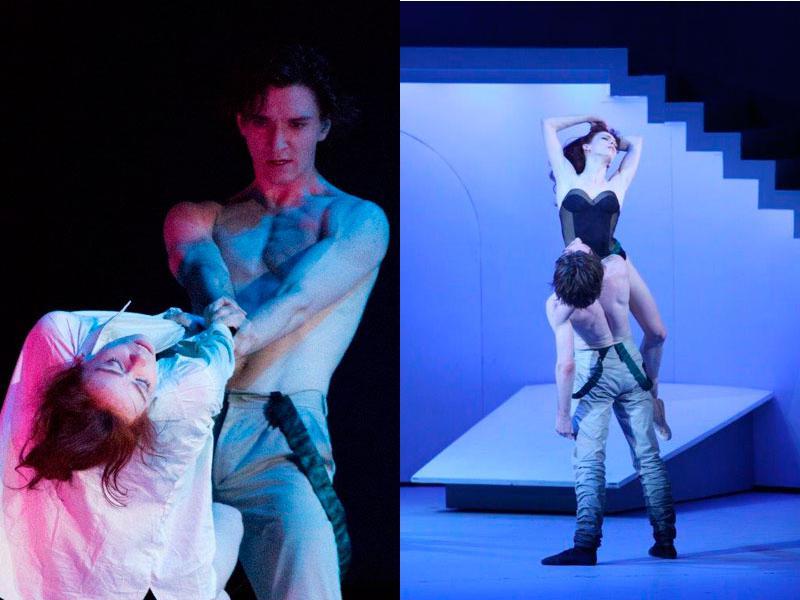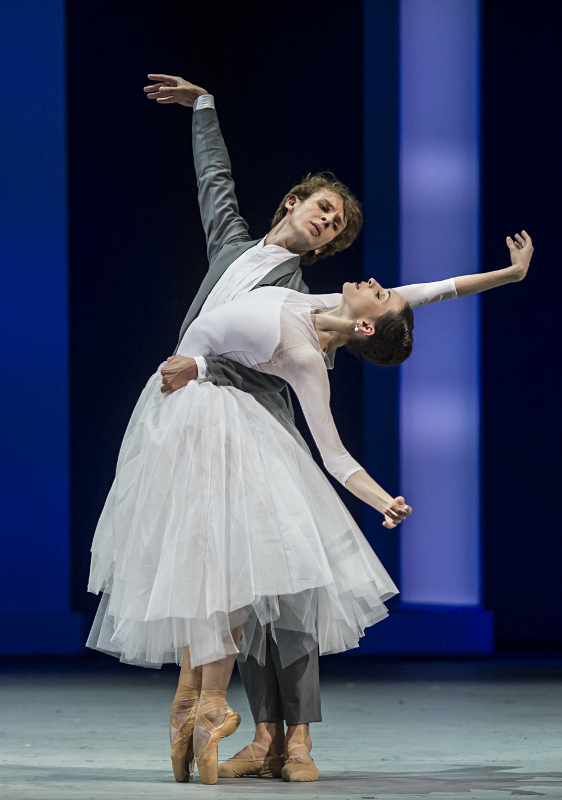The Taming of the Shrew, Bolshoi Ballet, Royal Opera House | reviews, news & interviews
The Taming of the Shrew, Bolshoi Ballet, Royal Opera House
The Taming of the Shrew, Bolshoi Ballet, Royal Opera House
Unfeminist comedy in Jean-Christophe Maillot's Shakespeare ballet

What do women want? Ballet plots are not the best guide, since the main desiderata – a well-paying job, coffee dates with girlfriends, not to die young of a broken heart – are rarely the lot of ballet heroines. Comedies at least tend to have the not-dying part covered, but they often fall down on at least one of two other big requirements: that one's family should be supportive, and that one's romantic partner should not be a chump.
Whether you love the production or find it mildly bemusing will probably depend on whether you find the slapstick bits of Prokofiev's Cinderella funny. Pantomimic ballet silliness has never really done it for me, but if you do like it, Maillot does it very well indeed: there is lots of mincing on pointe, hip-jiggling, exaggerated flat feet and so forth, all put together with fluent inventiveness and looking as good as you would expect on the rarefied Russian dancers, who can fully exploit the comic potential of long, long legs, exaggerated extensions and vampishly spiky fingers. Clean blue lighting (Dominique Drillot), a minimalist set of white shapes (Ernest Pignon-Ernest) and fairly simple modern costumes (Augustin Maillot) all help it to look and feel much fresher than Stuttgart Ballet's rather Blackadder-esque Cranko production, and the score is excellent, a skilful mash-up of Shostakovich's incidental music which sets just the right sardonic-yet-sentimental tone.
 Russians are extremely good at this tone (witness Alexei Ratmansky, whose Cinderella catches it brilliantly) and the Bolshoi soloists who play the named characters are all engaging in their various hammy roles. Anna Tikhomirova's Housekeeper is improbably glamorous, but a compelling stage presence in her black feather top; Artemy Belyakov's Baptista is genial and absent-minded like Peter Capaldi's Doctor (whom he much resembles physically); Vyacheslav Lopatin and Igor Tsvirko bring spark to the duff suitor roles of Gremio and Hortensio, the one short, randy and Cockney-flash with bling and snappy pirouettes, the other a big muscles/tiny brain type who shows off with barrel-turn pyrotechnics. Principal Olga Smirnova as Bianca is perhaps the oddest casting choice: the remote, otherworldly quality that makes her such an excellent Nikiya or Odette hardly fits the role of a golden everygirl younger daughter – though it is incongruously funny to see tall, dreamy Smirnova subjected to sisterly physical torments by brisk little Ekaterina Krysanova as Katharina. And all reservations are suspended for the duration of Smirnova's swoony pas de deux, set to the Romance from the Gadfly suite, with Semyon Chudin's dishy, princely Lucentio. (Wouldn't you just like to see him as Prince Florimund?). (Pictured above right: Chudin and Smirnova)
Russians are extremely good at this tone (witness Alexei Ratmansky, whose Cinderella catches it brilliantly) and the Bolshoi soloists who play the named characters are all engaging in their various hammy roles. Anna Tikhomirova's Housekeeper is improbably glamorous, but a compelling stage presence in her black feather top; Artemy Belyakov's Baptista is genial and absent-minded like Peter Capaldi's Doctor (whom he much resembles physically); Vyacheslav Lopatin and Igor Tsvirko bring spark to the duff suitor roles of Gremio and Hortensio, the one short, randy and Cockney-flash with bling and snappy pirouettes, the other a big muscles/tiny brain type who shows off with barrel-turn pyrotechnics. Principal Olga Smirnova as Bianca is perhaps the oddest casting choice: the remote, otherworldly quality that makes her such an excellent Nikiya or Odette hardly fits the role of a golden everygirl younger daughter – though it is incongruously funny to see tall, dreamy Smirnova subjected to sisterly physical torments by brisk little Ekaterina Krysanova as Katharina. And all reservations are suspended for the duration of Smirnova's swoony pas de deux, set to the Romance from the Gadfly suite, with Semyon Chudin's dishy, princely Lucentio. (Wouldn't you just like to see him as Prince Florimund?). (Pictured above right: Chudin and Smirnova)
 Krysanova's relationship with Vladislav Lantratov's disconcertingly Heath Ledger-like Petruchio is altogether less swoony, for all he seems like a terribly nice chap really, under that blustering exterior. Maillot claims extensively in the programme notes that his Katharina gives as good as she gets and that theirs is a marriage of equals, but what happens on stage reflects that only up to a point. Yes, there is some mildly touching shared humour and not a little chemistry between them, but none of that erased for me the fantastic asymmetry of their wedding scene (pictured left), in which Petruchio shoves Katharina violently without attracting censure, but her one retaliatory slap sours the mood completely. This, and various ostensibly milder forms of spousal abuse (if you think gaslighting is milder than battery) are the fly in the ointment of the Tahiti-trotting happy ending, where everyone marvels at Katharina and Petruchio's newfound harmony. Katharina dreamed of love right at the beginning; is it so unimaginable that she could get it without first undergoing the purgatory of Petruchio's "discipline"? Or spending most of the ballet in her underwear?
Krysanova's relationship with Vladislav Lantratov's disconcertingly Heath Ledger-like Petruchio is altogether less swoony, for all he seems like a terribly nice chap really, under that blustering exterior. Maillot claims extensively in the programme notes that his Katharina gives as good as she gets and that theirs is a marriage of equals, but what happens on stage reflects that only up to a point. Yes, there is some mildly touching shared humour and not a little chemistry between them, but none of that erased for me the fantastic asymmetry of their wedding scene (pictured left), in which Petruchio shoves Katharina violently without attracting censure, but her one retaliatory slap sours the mood completely. This, and various ostensibly milder forms of spousal abuse (if you think gaslighting is milder than battery) are the fly in the ointment of the Tahiti-trotting happy ending, where everyone marvels at Katharina and Petruchio's newfound harmony. Katharina dreamed of love right at the beginning; is it so unimaginable that she could get it without first undergoing the purgatory of Petruchio's "discipline"? Or spending most of the ballet in her underwear?
The day when ballet will actually teach us what women want is still remote, then, but Maillot's Shrew manages to be engaging despite its political incorrectness: more goofy than dangerous, and a decent addition to the repertoire of ballet comedies.
- The Bolshoi Ballet perform The Taming of the Shrew at the Royal Opera House until 4 August and other ballets in repertoire until 13 August.
- Read more dance reviews on theartsdesk
rating
Share this article
Add comment
The future of Arts Journalism
You can stop theartsdesk.com closing!
We urgently need financing to survive. Our fundraising drive has thus far raised £49,000 but we need to reach £100,000 or we will be forced to close. Please contribute here: https://gofund.me/c3f6033d
And if you can forward this information to anyone who might assist, we’d be grateful.

Subscribe to theartsdesk.com
Thank you for continuing to read our work on theartsdesk.com. For unlimited access to every article in its entirety, including our archive of more than 15,000 pieces, we're asking for £5 per month or £40 per year. We feel it's a very good deal, and hope you do too.
To take a subscription now simply click here.
And if you're looking for that extra gift for a friend or family member, why not treat them to a theartsdesk.com gift subscription?
more Dance
 'We are bowled over!' Thank you for your messages of love and support
Much-appreciated words of commendation from readers and the cultural community
'We are bowled over!' Thank you for your messages of love and support
Much-appreciated words of commendation from readers and the cultural community
 R:Evolution, English National Ballet, Sadler's Wells review - a vibrant survey of ballet in four acts
ENB set the bar high with this mixed bill, but they meet its challenges thrillingly
R:Evolution, English National Ballet, Sadler's Wells review - a vibrant survey of ballet in four acts
ENB set the bar high with this mixed bill, but they meet its challenges thrillingly
 Like Water for Chocolate, Royal Ballet review - splendid dancing and sets, but there's too much plot
Christopher Wheeldon's version looks great but is too muddling to connect with fully
Like Water for Chocolate, Royal Ballet review - splendid dancing and sets, but there's too much plot
Christopher Wheeldon's version looks great but is too muddling to connect with fully
 iD-Reloaded, Cirque Éloize, Marlowe Theatre, Canterbury review - attitude, energy and invention
A riotous blend of urban dance music, hip hop and contemporary circus
iD-Reloaded, Cirque Éloize, Marlowe Theatre, Canterbury review - attitude, energy and invention
A riotous blend of urban dance music, hip hop and contemporary circus
 How to be a Dancer in 72,000 Easy Lessons, Teaċ Daṁsa review - a riveting account of a life in dance
Michael Keegan-Dolan's unique hybrid of physical theatre and comic monologue
How to be a Dancer in 72,000 Easy Lessons, Teaċ Daṁsa review - a riveting account of a life in dance
Michael Keegan-Dolan's unique hybrid of physical theatre and comic monologue
 A Single Man, Linbury Theatre review - an anatomy of melancholy, with breaks in the clouds
Ed Watson and Jonathan Goddard are extraordinary in Jonathan Watkins' dance theatre adaptation of Isherwood's novel
A Single Man, Linbury Theatre review - an anatomy of melancholy, with breaks in the clouds
Ed Watson and Jonathan Goddard are extraordinary in Jonathan Watkins' dance theatre adaptation of Isherwood's novel
 Peaky Blinders: The Redemption of Thomas Shelby, Rambert, Sadler's Wells review - exciting dancing, if you can see it
Six TV series reduced to 100 minutes' dance time doesn't quite compute
Peaky Blinders: The Redemption of Thomas Shelby, Rambert, Sadler's Wells review - exciting dancing, if you can see it
Six TV series reduced to 100 minutes' dance time doesn't quite compute
 Giselle, National Ballet of Japan review - return of a classic, refreshed and impeccably danced
First visit by Miyako Yoshida's company leaves you wanting more
Giselle, National Ballet of Japan review - return of a classic, refreshed and impeccably danced
First visit by Miyako Yoshida's company leaves you wanting more
 Quadrophenia, Sadler's Wells review - missed opportunity to give new stage life to a Who classic
The brilliant cast need a tighter score and a stronger narrative
Quadrophenia, Sadler's Wells review - missed opportunity to give new stage life to a Who classic
The brilliant cast need a tighter score and a stronger narrative
 The Midnight Bell, Sadler's Wells review - a first reprise for one of Matthew Bourne's most compelling shows to date
The after-hours lives of the sad and lonely are drawn with compassion, originality and skill
The Midnight Bell, Sadler's Wells review - a first reprise for one of Matthew Bourne's most compelling shows to date
The after-hours lives of the sad and lonely are drawn with compassion, originality and skill
 Ballet to Broadway: Wheeldon Works, Royal Ballet review - the impressive range and reach of Christopher Wheeldon's craft
The title says it: as dancemaker, as creative magnet, the man clearly works his socks off
Ballet to Broadway: Wheeldon Works, Royal Ballet review - the impressive range and reach of Christopher Wheeldon's craft
The title says it: as dancemaker, as creative magnet, the man clearly works his socks off
 The Forsythe Programme, English National Ballet review - brains, beauty and bravura
Once again the veteran choreographer and maverick William Forsythe raises ENB's game
The Forsythe Programme, English National Ballet review - brains, beauty and bravura
Once again the veteran choreographer and maverick William Forsythe raises ENB's game

Comments
Surely 5 stars, Everyone